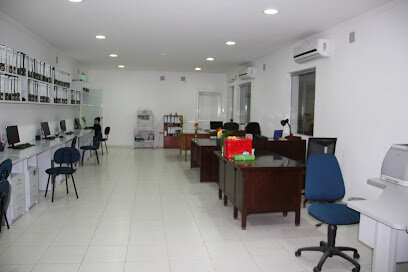Best Guardianship Lawyers in Asunción
Share your needs with us, get contacted by law firms.
Free. Takes 2 min.
List of the best lawyers in Asunción, Paraguay
About Guardianship Law in Asunción, Paraguay
Guardianship in Asunción, Paraguay, is a legal mechanism that establishes a relationship whereby an individual (the guardian) is appointed by the court to manage the personal, financial, or daily affairs of another person (the ward) who is unable to manage these responsibilities due to reasons such as minority, disability, or incapacity. The appointment is governed by Paraguayan civil law and is particularly intended to ensure that the best interests of those who cannot fully care for themselves are protected and supported.
Why You May Need a Lawyer
There are numerous situations where individuals might seek legal assistance regarding guardianship in Asunción. For instance, if you are a family member wishing to become the guardian of a minor or an incapacitated adult, legal expertise can help navigate the complexities of court proceedings and ensure proper documentation is submitted. Additionally, if disputes arise regarding existing guardianship arrangements, such as disagreements over the ward's welfare or financial decisions, a skilled lawyer can provide representation and mediation. Moreover, understanding the duties and limitations of a guardianship role through professional legal advice ensures compliance with all relevant Paraguayan laws and protects against potential legal challenges.
Local Laws Overview
Guardianship laws in Asunción are deeply rooted in Paraguayan civil code, which outlines several key aspects. The legal framework ensures that any person appointed as a guardian must act in the ward's best interest, managing both personal care and financial responsibilities prudently. The laws emphasize accountability and often require regular reporting to the court to monitor the welfare of the ward. Additionally, the appointment of a guardian requires a legal process, including the submission of evidence regarding the necessity for guardianship and establishing the proposed guardian's suitability. The courts prioritize family members as potential guardians but also consider other suitable individuals based on the ward’s needs.
Frequently Asked Questions
What is the legal definition of guardianship in Paraguay?
Guardianship is defined as a legal relationship in which a court appoints a guardian to make personal, financial, or other decisions for another person who cannot do so themselves due to incapacity.
Who can be a guardian in Asunción?
Typically, family members such as parents, siblings, or children are preferred. However, courts may appoint any responsible adult deemed suitable to act in the ward’s best interest, subject to a legal vetting process.
How does one apply for guardianship?
The process involves filing a petition with the local court in Asunción, providing documentation of the ward's incapacity, and demonstrating the ability to fulfill guardianship duties effectively.
Are there any alternatives to guardianship?
Yes, alternatives such as power of attorney and special judicial support measures are considered if they suffice to address the individual's specific needs without imposing full guardianship.
What responsibilities does a guardian have?
A guardian is responsible for overseeing both the everyday and significant life decisions of the ward, including their healthcare, education, and financial matters, ensuring they act in the ward’s best interest at all times.
How can guardianship be terminated?
Guardianship can be terminated by a court order when it’s no longer necessary, such as when a child reaches adulthood or an incapacitated person regains capacity, or if the guardian fails in their duties.
Is guardianship permanent?
Not necessarily; it can be temporary or permanent depending on the ward's situation. The court reviews the guardianship arrangement to ensure it serves its purpose as required.
Can a guardian make all decisions for a ward?
While a guardian makes many decisions, they must respect the ward’s preferences where possible and legally permissible. Certain decisions may still require additional court approval.
How often must a guardian report to the court?
Reporting frequency can vary but often includes regular updates on financial management and well-being assessments of the ward, ensuring transparency and court oversight.
What if there are conflicts in guardianship decisions?
If conflicts arise, legal recourse can be sought through the courts to mediate and resolve disputes, often necessitating legal representation for all involved parties.
Additional Resources
For those seeking more information or assistance with guardianship matters in Asunción, consult the local family courts or the Paraguayan Ministry of Justice. The Paraguayan Bar Association may also provide referrals to experienced guardianship lawyers. Non-profit organizations dedicated to family welfare and legal aid can offer further guidance and support in navigating these complex legal waters.
Next Steps
If you are in need of legal assistance regarding guardianship, it is advisable to consult a specialized attorney who can provide personalized advice and facilitate the legal process. Begin by gathering all relevant documentation such as medical records or existing legal documents related to the ward. Contact your local courthouse in Asunción to understand specific procedural requirements and consider scheduling a consultation with a qualified lawyer to assess your situation comprehensively. Legal professionals can help you prepare for any hearings and ensure compliance with Paraguayan law, ultimately smoothing the path towards establishing a guardianship arrangement that serves the best interests of all parties involved.
Lawzana helps you find the best lawyers and law firms in Asunción through a curated and pre-screened list of qualified legal professionals. Our platform offers rankings and detailed profiles of attorneys and law firms, allowing you to compare based on practice areas, including Guardianship, experience, and client feedback.
Each profile includes a description of the firm's areas of practice, client reviews, team members and partners, year of establishment, spoken languages, office locations, contact information, social media presence, and any published articles or resources. Most firms on our platform speak English and are experienced in both local and international legal matters.
Get a quote from top-rated law firms in Asunción, Paraguay — quickly, securely, and without unnecessary hassle.
Disclaimer:
The information provided on this page is for general informational purposes only and does not constitute legal advice. While we strive to ensure the accuracy and relevance of the content, legal information may change over time, and interpretations of the law can vary. You should always consult with a qualified legal professional for advice specific to your situation.
We disclaim all liability for actions taken or not taken based on the content of this page. If you believe any information is incorrect or outdated, please contact us, and we will review and update it where appropriate.









